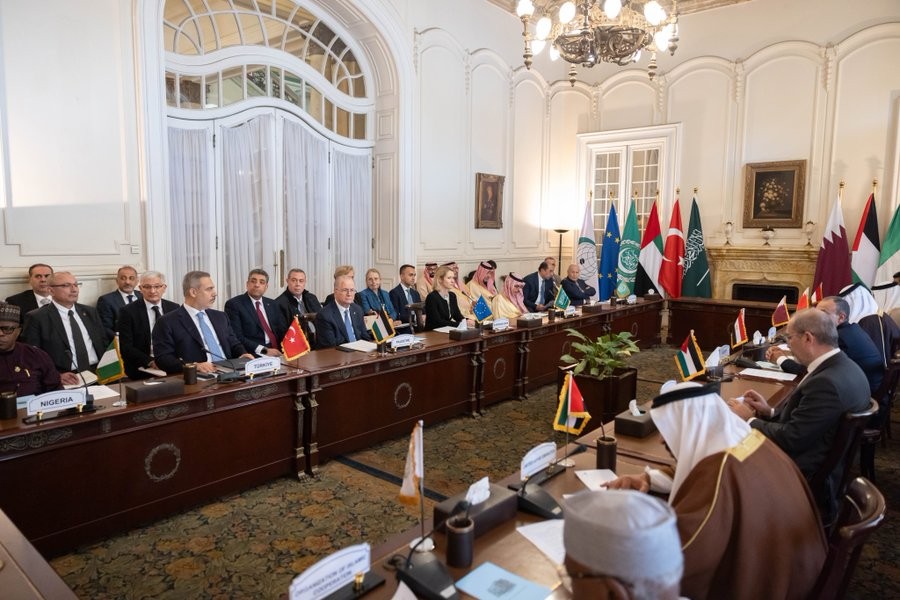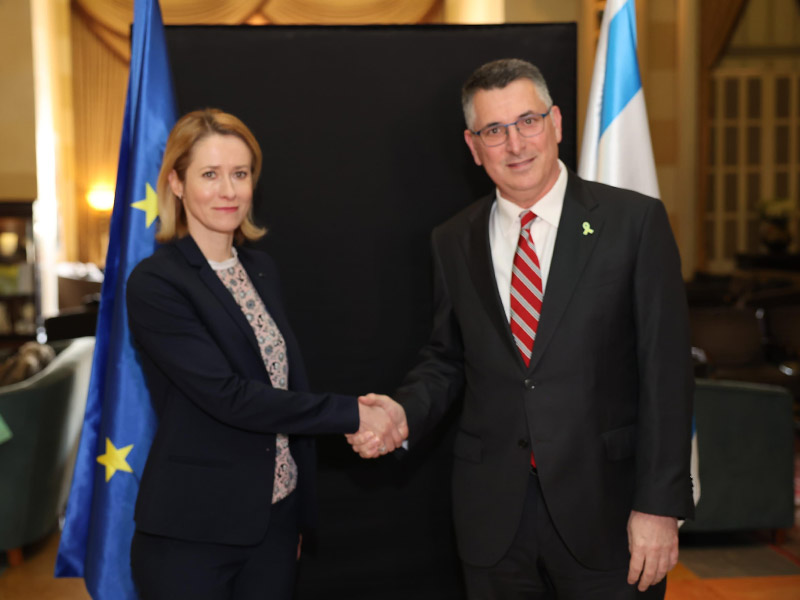Kaja Kallas, EU High Representative for Foreign Affairs and Security Policy, travelled a week ago to the Middle East where she met representatives of Israel and the Palestinian Authority and participated in a meeting in Cairo with the Arab - Islamic Ministerial Committee.
Since then, the situation in the region has continued to deteriorate with no end sight of the war in Gaza. On Wednesday morning, the Israeli army expanded its military operation in Gaza after evacuation orders to the civilian population and overnight air strikes.
The defence minister Israel Katz announced that the areas where the fighting took place would be cleansed of terrorists and annexed to Israel's security zones. He also called on the inhabitants in Gaza Strip to act to eliminate Hamas and return all the hostages and claimed that "this is the only way to end the war." Katz was appointed to new defence minister in the middle of the war because of his loyalty to Prime Minister Netanyahu.
His announcement was immediately met by a sharp rebuke by the families of the hostages, accusing the government of sacrificing the hostages for the sake of territorial gains. “Instead of securing the release of the hostages through a deal and ending the war, the government is sending more soldiers into Gaza to fight in the same areas where battles have already taken place repeatedly.
Katz called on the civilian population "to act to eliminate Hamas” but the new ground offensive will probably have the opposite effect. The spontaneous demonstrations which took place last week in Gaza against Hamas rule, which only has brought endless suffering on the civilian population, never reached a critical mass. With no alternative to Hamas there is no hope for a better future for Gaza.
A ceasefire-hostage deal was agreed between Israel and Hamas on 17 January but Israel resumed the war a month later in breach of the agreement. It foresaw the withdrawal of Israeli troops from the Gaza Strip and a second phase which would lead to the release of remaining hostages in exchange of Palestinian prisoners and the permanent end of the hostilities.
The full implementation of agreement was also expected to pave the way for the rebuilding of the devastated Gaza Strip and a political solution to the conflict. Instead, Prime Minister Benjamin Netanyahu, pressured by the extremist ministers in his government, resumed the war claiming that Hamas had rejected American proposals for the release of the Israeli hostages.
In the north, Israel has not withdrawn completely from southern Lebanon where the Lebanese army has not yet been fully deployed and occasional shooting against Israel still occurs. Israel also continues to occupy a buffer zone in southern Syria since the fall of the Assad regime. The Israeli government cites short-sighted security reasons in both cases but the actions risk to become counterproductive.
There are still 59 hostages kept by Hamas in Gaza, of which half are believed to be alive. The resumption of the war is seen as a death sentence for the hostages by their families who are demanding that all should be released in one step, without any “selection”, before it is too late. For this to happen, the two sides must agree to discuss to end the war.
For Hamas, the hostages serve as a life insurance, and it needs assurances that the war will end before releasing all of them. The Israeli Prime Minister keeps the issue open for domestic reasons to ensure the survival of his government. Furthermore, the overhaul of the judiciary system and the democratic checks and balances in Israel continues in full speed and is heading towards a constitutional crisis.
He has recently also become embroiled in an Israeli version of Qatargate and was summoned to a police interrogation on Monday in the middle of his own corruption trial. The war for the elusive goal of “total victory" is used as a pretext to defer the calls for a state commission of inquiry to investigate his and the government’s responsibility for Hamas’ surprise terrorist attack on 7 October.
The mediators, the US, Egypt and Qatar, are continuing their work in slow-motion. The latest proposals are focusing on the release of a small number of hostages and the extension of the ceasefire. There is no breakthrough yet in the talks but the period until the Jewish Passover holiday on 12 April is considered as critical.
Egypt has proposed the release of 5 hostages, Israel demands 11 hostages with no commitment to start talks on the second phase of the ceasefire. In Israel, a majority supports a deal to return all the hostages and end to the war according to the most recent opinion poll. The majority of the public has lost trust in the government. Even among those who voted for the government, barely half of them still trust it.

Kaja Kallas at the meeting with Arab-Islamic Ministerial Committee in Cairo, 23 March, credit: EU
During her visit to the region, High Representative Kallas issued a joint statement with the Arab-Islamic Ministerial Committee in Cairo and press remarks at her joint press conference with the Israeli foreign minister Gideon Sa’ar. She did not to reply to a request from The Brussels Times for comments on the meetings.
In the joint statement (23 March) the parties reaffirmed their ”full commitment to a political resolution to the conflict on the basis of the two-state solution with Israel and Palestine, living side by side in peace and security.”
Asked if the parties, among the parameters of a Palestinian state, discussed if it should be demilitarized, EU foreign affairs spokesperson Anouar El Anouni replied that the High Representative reiterated the point that Hamas cannot have a role in Gaza’s governance. “The Palestinian Authority is the legitimate partner to govern Gaza, including the security apparatus.”
In her press remarks, Kallas said that "We do not support Hamas participating in the governance of Gaza in the future". Do the Arab countries agree to this and how can it be achieved without resuming the war in Gaza?
“Indeed, that is our position as mentioned above,” the spokesperson explained. “When this war ends, Gaza must be rebuilt as swiftly as possible, and the Arab-backed plan charts a realistic way to achieve that. The plan still has some open issues on governance and security which we will be engaging on with Arab partners to address in a satisfactory manner.”
According to media reports, Egypt could consider to allow half a million Palestinians to leave Gaza and settle in north-eastern Sinai, at least temporarily during the reconstruction of Gaza? Was this discussed with Egypt?
“This question should be addressed to the Egyptian authorities. It was not discussed during the meetings,” he replied.
While Kallas’s meeting in Cairo ended in a joint statement, no joint statement was issued after her meeting with the Israeli foreign minister, who hardly replied to any questions to journalists and if he did, replied very briefly. He became foreign minister after switching side, leaving the opposition and joining Netanyahu's government.
In view of Israel's violation of the ceasefire deal and resumption of the war in Gaza, its continued strikes against Lebanon and in Syria, the escalation of violence in the West Bank - can the current Israeli government be trusted to pursue political and diplomatic solutions to the conflicts?
“In both the meetings and public press engagements during her visit, the High Representative was very clear in calling for an end to the violence and a return to the ceasefire. She called for the resumption of humanitarian aid and for the protection of civilians at all times. These are messages that we will continue conveying to the Israeli counterparts for as long as they are needed.”
M. Apelblat
The Brussels Times

